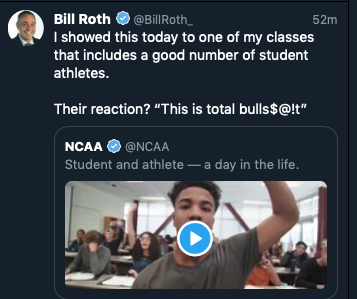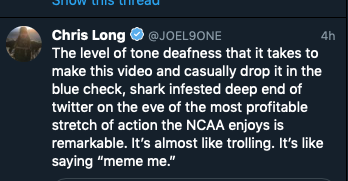Earlier this week, the NCAA released a commercial to promote its brand. This makes sense because we’re in the thick of the NCAA basketball tournaments. What better time to highlight and publicize what you do, right?
The problem is the messaging. It doesn’t reflect life for a typical student-athlete, which I assume was the Association’s intent. Current and former college athletes have said as much.
Bill Roth, an ESPN broadcaster, 11-time Virginia Sports Broadcaster of the Year and a sports media professor at Virginia Tech, asked his students, many of them student-athletes, what they thought of the promo. Read the reaction for yourself.

Roth added that one student-athlete in his class said he was up until 4:10 a.m. for treatment, meetings, workouts, film and then class. That schedule will repeat.
Some reading know that I worked in college athletics. I also know the responsibility of being a student-athlete has only become more demanding since I left the business full-time. I echoed Roth about the NCAA promo: it’s disrespectful. Is college athletics great for students who are fortunate enough to participate? Absolutely. Is it a stroll through campus with a commitment or three each day? Hardly. Being part of a college sports program, as the promo’s graphic says, provides opportunities for life. The truth, however, is that you have to add about five or seven required stops in that day, and some student-athletes need a lot of guidance for the life part because all they know is their sport.
The NCAA, known for its PR slips through the years, should know better than to air an “oops” that will be seen by millions of people millions of times during the next two weeks. It won’t keep people from watching basketball games, but fans will tease, criticize and contradict it publicly through the fortnight. Philadelphia Eagles defensive end Chris Long, who played college football at Virginia, wondered “the level of tone deafness that it takes to make this video …” in a social media post.

Inquiring minds ask if PR professionals were consulted pre- and post- production. One thing I stress to publicity clients is to be real (“authentic” is an overused word, but you get it). People see through a phony message. And the NCAA, which is as public and profitable organization as there is, should know better than to push a tall tale when the world is watching. It would have been perfectly acceptable to continue to use its years-old spot that says most student-athletes will go pro in something other than sports.
To avoid pushback for future promos, the NCAA staff might want to talk to real student-athletes before they green-light its next message.
###
©Gail Sideman, gpublicity.com 2019